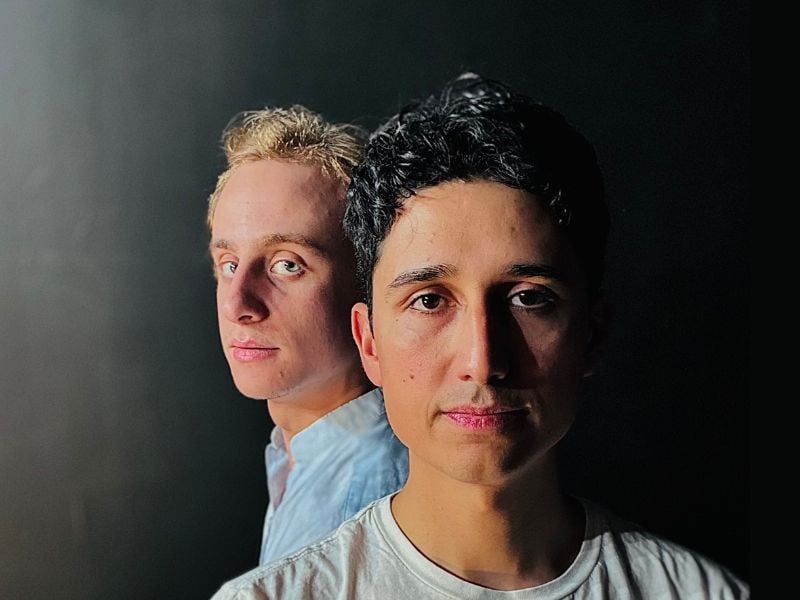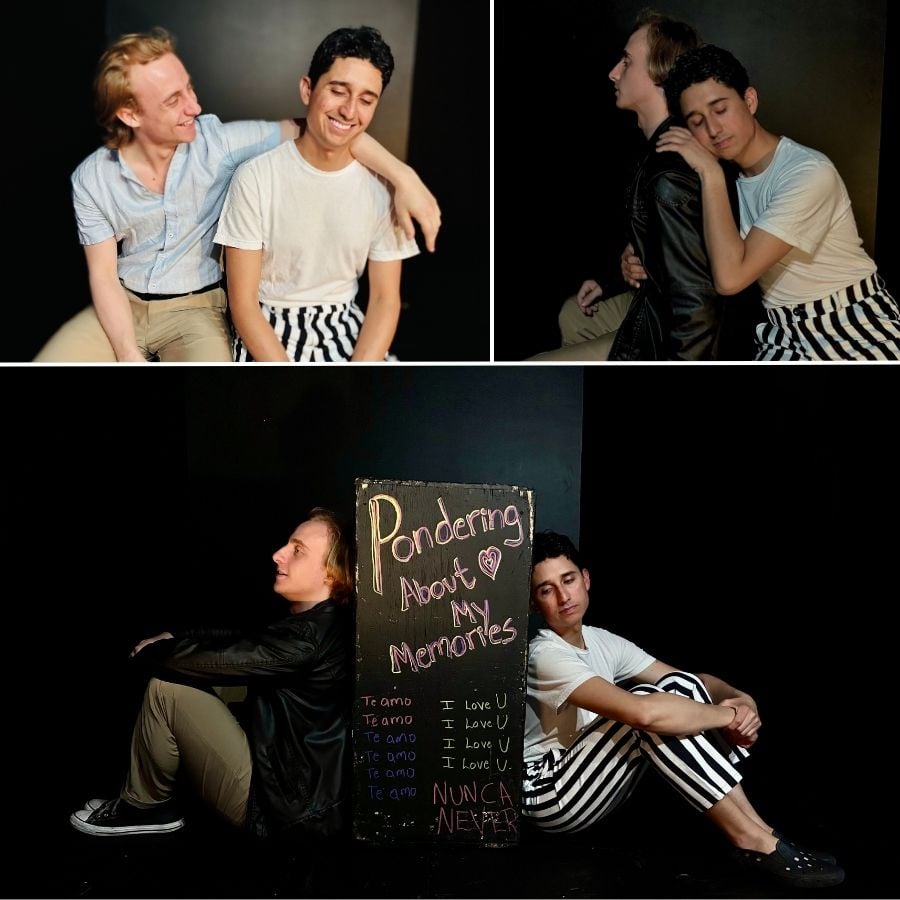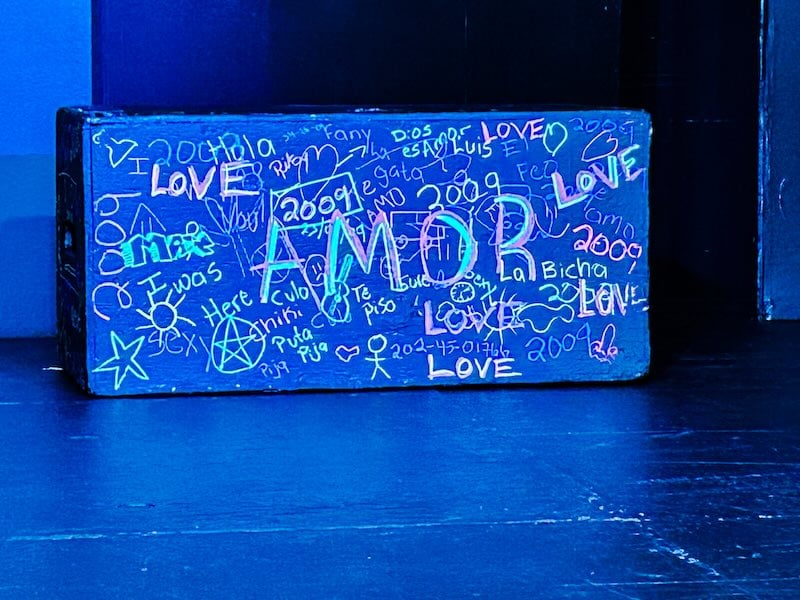In the center of the stage at Teatro de la Luna’s intimate black box in Petworth is a black block covered with graffiti on the theme of “AMOR” and “LOVE” — hearts and stars and such, scrawled in fluorescent-colored chalk. That simple set piece points to the gist of the play we’re about to see — a queer adolescent’s fateful infatuation with an agemate — but it barely hints at the heart-rending emotionality that will flood the space as Rodin Alcerro’s profoundly affecting two-hander, Pondering About My Memories, unfolds.
Alcerro, who also directs, wrote his heartfelt play in Spanish. (“I am the only one that can do the theater I want to see,” he said matter-of-factly during a talkback on opening night.) Alcerro’s tight and touchingly poetic text is performed in Oscar Quiroz’s engaging English translation, accompanied by on-screen Spanish surtitles — a reversal for Teatro de la Luna, which performs in Spanish with English surtitles.

I first discovered Pondering About My Memories during last summer’s Capital Fringe Festival in a production I adored. (My rave is here.) Upon learning that the play would be remounted with the same superb cast — Pablo Guillén as Manasés, the young man who recalls his teenage crush on Max, played by Joshua Lucas — I didn’t think twice about seeing the play again. Suffice it to say, I was smitten again.
The character of Honduran-born Manasés functions both as the play’s thirtysomething narrator/memoirist, who addresses the audience, and, stepping into the play’s multiple memory scenes, as the boy he remembers being when he found his first friend (and first love) in American-born Max. Their relationship quickly becomes a hold-your-breath storyline that turns with stunning twists on whether Max will reciprocate Manasés’ impassioned affection.
In a line that sums up the play’s form and content beautifully, Manasés says of Max:
Sometimes a memory will exhaust itself and feel the need to escape. But if I let him go, what will I have left? Life is nothing but treasuring memories, otherwise…
He trails off.
Early on, as the boys rest side-by-side from a remembered game of catch, Manasés asks, out of the blue, “What do we live for? Have you ever wondered that?” Within moments, Manasés feels guilt because he didn’t know at the time that Max’s older brother had recently committed suicide, shamed and rejected by their religious parents for crossdressing. Max shares that he discovered the body, wearing women’s clothes, when he went into his brother’s bedroom to give him a hug on his 23rd birthday. Manasés, immediately realizing that his “What do we live for?” query was a gaffe, pursues Max to apologize to him.
I tease out those two details — Max’s impulse to give his brother a hug, and Manasés’ impulse to give Max an apology — because they betoken the deep well of tenderness and sensitivity that flows through this entire production and that writer-director Alcerro has an all-access pass to.

That keen centrality of inner feelings finds expression in every instant of Guillén’s and Lucas’s performances. They mime endearing glimpses from their youthful lives, such as when they skip pebbles across the surface of an imagined body of water. They slip easily in and out of the present and past (some memories of which Manasés admits are wishful and false). They flit like sprites from thought to thought and memory to memory. They can be jocular and outright goofy. Episodically, they transcend the script’s poetry, interposing between passages of text emotively revelatory storytelling in wordless pas de deux. (Both actors are Synetic movement theater alums, and it shows.) At points when the characters’ emotions erupt outside the sayable or danceable, Brandon Cook’s sound design and an uncredited lighting design pack an emphatic wallop.
Wit and humor are amply at play as when Max invites Manasés to come to dinner with his parents, who are devout and homophobic, and the ensuing scene of family fracturing is depicted as tabletop comedy with cutout puppets on sticks.
When the play takes a dark turn, it’s wrenching: After losing touch with Max for a while, Manasés learns to his dismay that Max has been absent because he has a girlfriend, Emily, whom he got pregnant. Max asks Manasés to sign an authorization for Emily to get an illegal abortion since Manasés, at 18, is of age to do so. Manasés agrees; it’s for his beloved friend, so of course. The fallout from that high-stakes decision (which I’ll not disclose) is heartbreaking — and feels ripped from today’s headlines.
Among the marvels of this play is how much topicality is subtly embedded in it — touched on are religion and gender, immigration and reproductive freedom, even the carceral state comes up — yet pulsing through Pondering About My Memories is the emotional propulsion of a precious but precarious queer crush.
Catch it and feel it if you can. It’s a gem.

Running Time: 50 minutes with no intermission.
EXTENDED: Pondering About My Memories/Reflexión sobre el Recuerdo plays through June 7, 2025, presented by Teatro de la Luna at the House of the Moon, 4020 Georgia Avenue NW, Washington, DC. Purchase tickets ($30 regular; $25 students and seniors 60+) by phone (202-882-6227), by email (info@teatrodelaluna.org), or online.
In English with Spanish surtitles.
Pondering About My Memories/Reflexión sobre el Recuerdo
Written and directed by Rodin Alcerro
Translated by Oscar Quiroz
CAST
Manasés: Pablo Guillén
Max: Joshua Lucas
PRODUCTION TEAM
Sound Designer: Brandon Cook
Sound Operator: Silvana Fierro
Light Operator: Sara Corral
Marketing & Promotion: Marcela Ferlito
Graphic Design: Creativity LLC
Web Page: Tortuyen
Power Point Presentation: Silvana Fierro
Power Point operator: Marcela Ferlito
Box Office: Silvana Fierro, Adrián Flores
Production: Nucky Walder
Production Assistants: Sara Corral, Silvana Fierro
Assistants: Máximo Cáceres, Sara Corral, Marco Echeverria, Santa López, Gabriel Lora, Martha Redín, Lorena Urra.
SEE ALSO:
Teatro de la Luna to present ‘Pondering About My Memories/Reflexión sobre el Recuerdo’ by Rodin Alcerro (news story, April 25, 2025)
‘Pondering About My Memories’ by Rodin Alcerro (2024 Capital Fringe review by John Stoltenberg, July 14, 2024)



